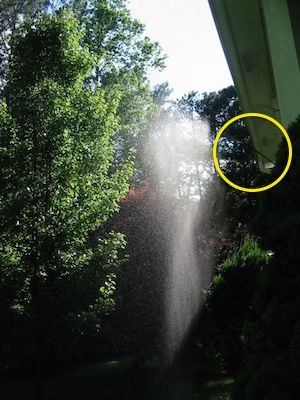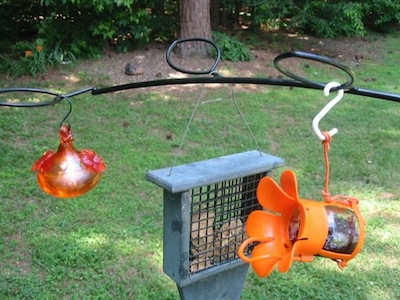The Ever So Versatile Bird Feeder Bracket

A simple deck-mount bracket (circled in yellow) accommodates a leaf mister during summer months. Actually mounted on the front porch, the extended arm bracket just slips right onto the rail. This makes it easy to move, and with the mister attached, makes for a happy and lush garden below. When it’s time to put the misters away in late fall, a bird bath or feeder will likely hang from the same spot. In early spring there’s always nesting materials offered in this spot.
Want to see more species of birds but limited on space? No trees to hang from and only one feeder pole in the yard? Check this cool bird feeder bracket with quick-connect that attaches right to a pole – no hardware needed. With a sleek curved shape and leaf design, there’s room for 3 or 4 more items. All of a sudden you’re seeing new birds in the same space!
No-melt suet is great for warm weather feeding as migratory birds enjoy it too. Grape jelly in an oriole feeder entices cat birds and woodpeckers.
Again, if space is limited for hanging feeders, remember that birds bathe naturally at ground level. Fresh water is the easiest way to entice feathered friends. A shallow pan of water is bound to bring some birds who may never even visit feeders. Keep the water fresh and more importantly… shallow. With lots of juveniles about, deep water can be fatal. No more than two inches is a perfect depth for birds to bathe, wade, preen and drink. Adding some stones or a few larger rocks gives birds added security with better footing, they make it easier to land and perch.
For all those who “don’t feed birds in summer” well, you happen to be missing two exciting times during the year when neotropic birds migrate. The opportunity for catching some new species pass through is pretty incredible… even for veteran backyard birders! That flash of orange from a Baltimore oriole, or the vivid colors of a painted bunting are in part what it’s all about!

